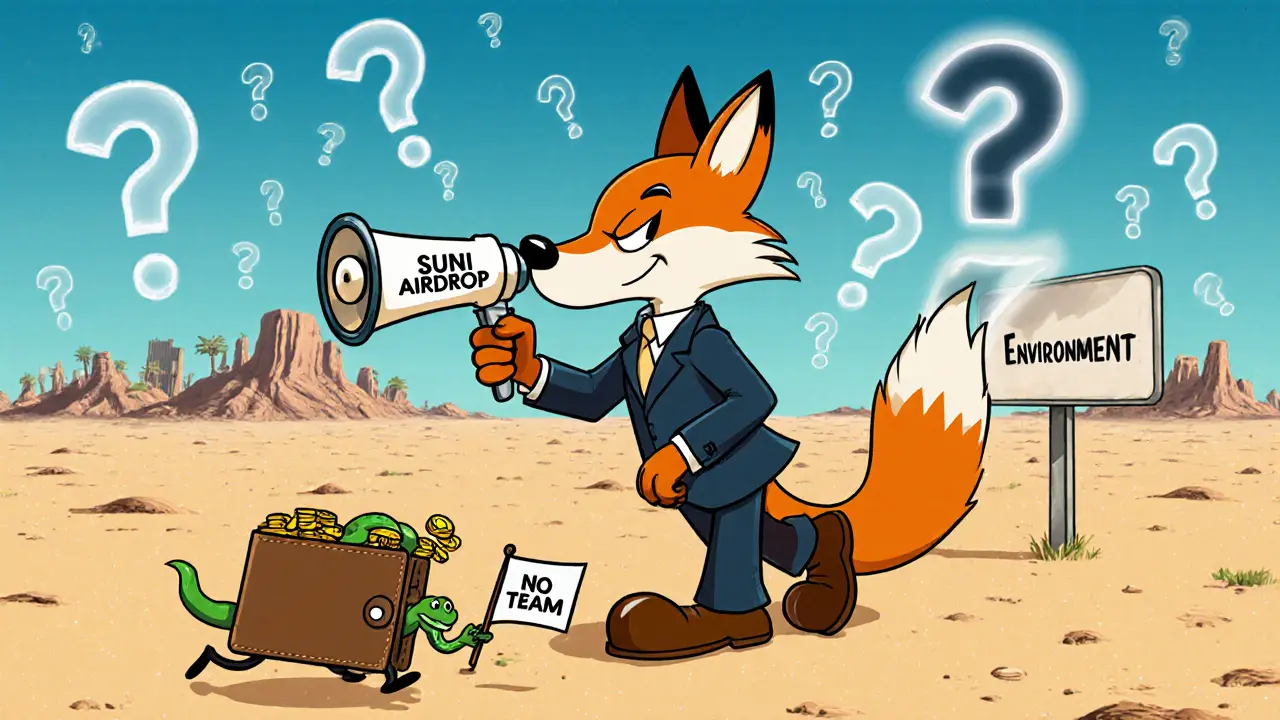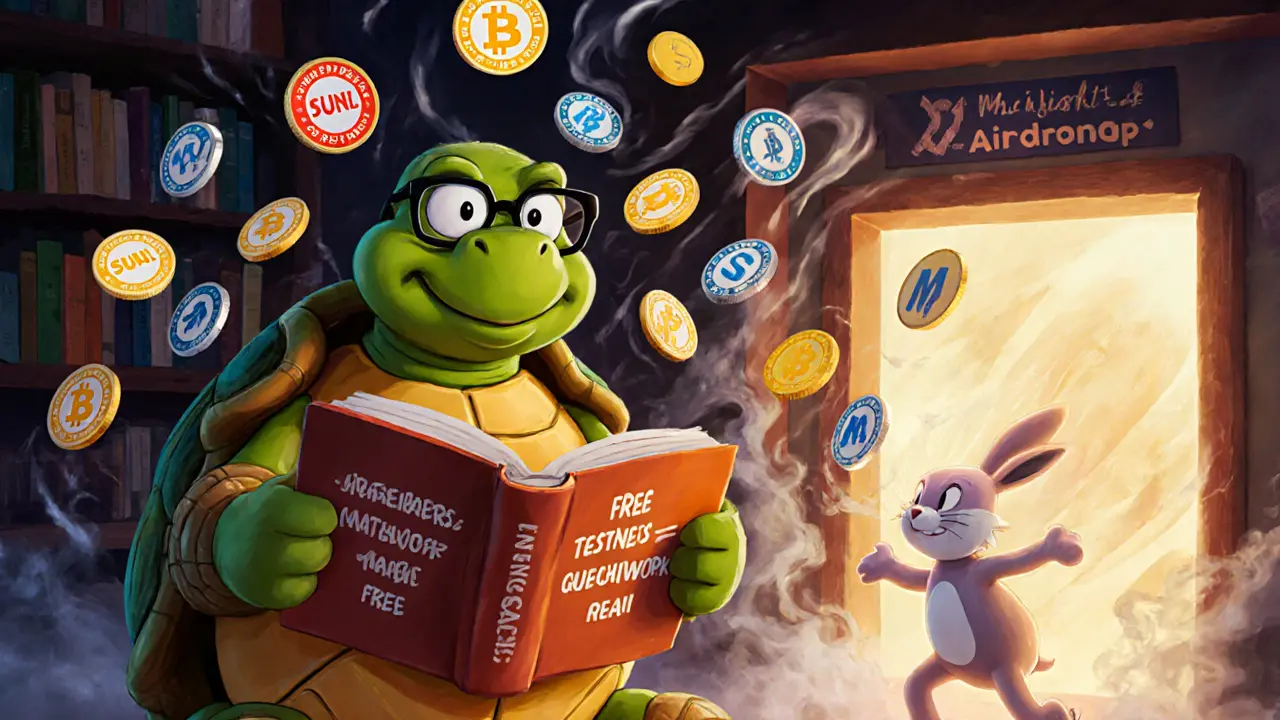
There’s a new airdrop floating around the crypto space called SUNI, and it’s drawing attention - but not because it’s flashy or well-known. It’s drawing attention because almost nothing is known about it. If you’ve seen a post saying you can claim 4,118 SUNI tokens for free through CoinMarketCap, you’re not alone. But before you click, you need to understand what you’re really signing up for.
What Is the SUNI Airdrop?
The SUNI airdrop is a token distribution event run by a project calling itself SUNI. It’s handing out 3.5 million SUNI tokens to 850 people. That’s about 4,118 tokens per person. Sounds generous? Maybe. But here’s the catch: as of now, those tokens are worth approximately $0. No trading, no exchange listings, no market value. Just a number on a screen. The only official way to participate is through CoinMarketCap’s airdrop portal. You won’t find a website for SUNI. No whitepaper. No GitHub repo. No Twitter account with verified checkmarks. No Telegram group with 10,000 members. Just a listing on CoinMarketCap’s airdrop page. That’s it. CoinMarketCap does vet projects before hosting their airdrops, but that doesn’t mean the project itself is legitimate or valuable. It just means the platform checked for obvious red flags - like bot farms or fake accounts. It doesn’t check if the project has a team, a plan, or a future.Why Is the Token Worth $0?
A $0 valuation doesn’t always mean a scam. Sometimes, it means the token hasn’t launched yet. But in this case, it likely means one of three things:- The SUNI token isn’t live on any exchange, so there’s no market to set a price.
- The project hasn’t built any utility - no app, no protocol, no reason for anyone to hold the token.
- The entire thing is a placeholder, waiting for someone to build something later - if they ever do.
How Do You Claim SUNI Tokens?
If you still want to try, here’s how it works:- Go to CoinMarketCap’s official airdrop page - not a link from a tweet or Discord.
- Find the SUNI campaign in the list.
- Connect your wallet. Make sure it’s a wallet you control, not one from an exchange.
- Complete any required tasks. These might include following CoinMarketCap on social media or verifying your email.
- Wait for confirmation. If you’re selected, tokens will be sent to your wallet after the campaign ends.
coinmarketcap.com. If someone messages you on Telegram saying they’re from SUNI and asks for your seed phrase - block them. Immediately.

What’s the Catch?
There’s always a catch. The SUNI project claims to be about “fighting our environment.” That’s vague. Are they building a carbon credit system? A blockchain for reforestation tracking? A token to fund ocean cleanup? No one knows. There’s no website, no team bios, no technical documentation. You’re betting on a mystery. Most successful airdrops come from projects that already have users. SUNI has zero public users. No beta testers. No community. No roadmap. Just a token distribution with no product to back it. This isn’t like early Ethereum or Solana airdrops. Those had developers, GitHub commits, and public testnets. SUNI has a CoinMarketCap listing and a number.Is This a Scam?
It’s not definitely a scam. But it’s also not a project you can trust. A scam usually asks for money. This doesn’t. That’s good. But a scam can also be a “rug pull” disguised as a gift. The team could disappear after the airdrop, leaving you with worthless tokens. Or they could list the token on a low-liquidity exchange and pump it for a few days before dumping. There’s no way to verify the team behind SUNI. No LinkedIn profiles. No past projects. No interviews. Nothing. That’s not just risky - it’s irresponsible to invest even a moment of your time without more information.
Who Is This For?
Only two kinds of people should consider joining:- Those who treat crypto airdrops like lottery tickets - small time, low stakes, no expectations.
- Those who want to test how much they can learn from zero information.
What Should You Do Instead?
If you want to participate in real airdrops in 2025, look for these signs:- A working product or testnet
- A public team with names and LinkedIn profiles
- A whitepaper or technical documentation
- A community on Discord or Telegram with active moderation
- Partnerships with known entities - not just CoinMarketCap
Final Thoughts
The SUNI airdrop isn’t dangerous - it’s meaningless. There’s no harm in claiming the tokens if you’re okay with them being worthless. But don’t confuse participation with progress. Don’t think you’re getting ahead because you got free tokens. You’re not. You’re just holding a digital placeholder with no purpose. If you’re serious about crypto, don’t chase empty promises. Build your knowledge. Wait for projects that show their work. The next big airdrop won’t come from a mystery. It’ll come from a team that’s already building something real.Is the SUNI airdrop real?
Yes, it’s real in the sense that CoinMarketCap is hosting it. But “real” doesn’t mean valuable. The tokens have no market value, and the project behind them has no public presence. It’s a distribution with no product.
Can I sell SUNI tokens after claiming them?
No, not right now. There are no exchanges listing SUNI. Even if you claim the tokens, you can’t trade them. They’re essentially digital collectibles with no market.
Do I need to pay anything to claim SUNI tokens?
No. Legitimate airdrops never ask for money. If anyone says you need to pay gas fees, unlock your wallet, or send crypto to claim SUNI - it’s a scam. Only interact with the official CoinMarketCap airdrop page.
Why does CoinMarketCap host this airdrop if the project is so vague?
CoinMarketCap hosts hundreds of airdrops to keep users engaged. They verify basic legitimacy - like no bot farms - but they don’t evaluate the project’s long-term potential. Hosting an airdrop is a service, not an endorsement.
Is SUNI part of the SUI blockchain?
There’s no evidence it is. The SUI ecosystem had many airdrops in 2025, but SUNI isn’t listed among them. It’s not built on SUI, Ethereum, or any known chain. The token’s underlying network is completely unknown.
What does “fighting our environment” mean for SUNI?
It’s unclear. The phrase appears nowhere else in public materials. It could be a placeholder, a translation error, or a marketing buzzword. Without a whitepaper, website, or team, there’s no way to know what environmental purpose the token is supposed to serve.
Should I connect my main wallet to claim SUNI?
Use a separate wallet you don’t use for other assets. Even if the airdrop is legitimate, unknown projects can be risky. Keep your main wallet safe. Only connect wallets you’re willing to lose if something goes wrong.
When will SUNI tokens be listed on exchanges?
No one knows. There’s no announcement, no timeline, no team to make one. If listing happens, it’ll likely be sudden - and possibly manipulative. Don’t wait for it. Don’t hold the tokens hoping for value.

David Hardy
November 25, 2025 AT 14:18Free tokens? Sure, why not 🤷♂️ I claimed it and didn’t even check my wallet for a week. Now I’ve got 4,118 digital post-it notes. Worthless? Probably. But hey, I didn’t lose anything. Crypto’s a casino anyway. 🎰
Caren Potgieter
November 25, 2025 AT 17:42i just think its kinda cool that someone out there is trying to do something for the environment even if its vague like who knows maybe its a secret project that just needs time 🌱
Lisa Hubbard
November 27, 2025 AT 02:51Look I get it, the whole thing smells like a ghost town with a CoinMarketCap badge slapped on it. No website, no team, no roadmap, just a number and a promise that sounds like it was written by a bot that got lost in a TED Talk. And yet… I still clicked ‘claim’. Not because I think it’ll be worth anything, but because I’m weirdly curious about how far people will go to chase free stuff with zero substance. It’s like collecting expired coupons from a store that shut down in 2012. You don’t need it. You don’t want it. But you took it anyway. And now you’re just waiting for someone to explain why you did. Spoiler: no one will. And you’ll be fine with that.
Linda English
November 28, 2025 AT 11:09I really appreciate how thoughtful this post is-it’s so easy to get swept up in the hype of ‘free tokens,’ but this breaks it down with such care. I think it’s important to remember that not every opportunity needs to be seized; sometimes, the most valuable choice is the one you don’t make. And if you do claim it? Use a burner wallet. Always. Protecting your main assets isn’t paranoia-it’s basic hygiene in this space. I’ve seen too many people lose everything because they thought ‘it’s just a small airdrop.’ But in crypto, small things can have huge consequences. Take your time. Be gentle with yourself. You don’t have to chase everything that glows.
Amanda Cheyne
November 28, 2025 AT 12:20CoinMarketCap is owned by Binance. Binance is owned by the U.S. government. The U.S. government is using this to track crypto wallets and build a digital ID system. They don’t care if the tokens are worthless-they care if you clicked. Every time you connect your wallet, they log your IP, your device fingerprint, your transaction history. This isn’t an airdrop. It’s a honeypot. They’re harvesting your data so they can freeze your assets later. And if you think I’m crazy, ask yourself why there’s no website. Because they don’t want you to look too closely. They want you to just click, connect, and move on. Wake up.
Matthew Prickett
November 29, 2025 AT 17:37Okay but imagine if this is the *real* rug pull-where they don’t even need to steal your money. They just need you to believe you’re part of something big. You claim the tokens. You post about it on Twitter. You tell your friends. You become a walking ad for a project that doesn’t exist. And then… nothing. No crash. No scam. Just silence. And you’re left feeling stupid for believing in nothing. That’s the real win for them. You don’t lose crypto-you lose your trust in the whole system. And that’s way more valuable to them than your ETH.
Jennifer MacLeod
November 30, 2025 AT 16:28love that you pointed out the environmental thing its so vague but honestly i think its a vibe not a project and thats okay in crypto these days
Jennifer Morton-Riggs
December 1, 2025 AT 05:41Let’s be real-this isn’t about tokens. It’s about the psychology of scarcity in a world that’s drowning in abundance. We’re trained to believe free = valuable, even when the math says otherwise. We’re addicted to the dopamine hit of ‘claiming’ something, even if it’s just a number in a blockchain that no one cares about. This airdrop is a mirror. It shows us how much we still believe in magic, even after we’ve seen every trick. And that’s why it’ll work. Not because it’s smart. But because we are.
Kathy Alexander
December 2, 2025 AT 21:21Someone’s going to list this on a DEX with 100k liquidity and pump it to $0.0002 for 48 hours. Then dump. Then the same people will post ‘I told you so’ on Reddit. Meanwhile, the team will rename the token to ‘SUNI2’ and do it again. This isn’t a project. It’s a franchise. And you’re the first customer.
Tejas Kansara
December 3, 2025 AT 06:36claim it if you want but dont get attached. its just a testnet for future projects. no harm no foul.
preet kaur
December 4, 2025 AT 11:10in india we have so many fake airdrops but this one feels different… like its not trying to trick you, just… exist? maybe its a quiet experiment, like a poem written in code. i dont know if its worth anything, but i like that someone is trying to make something beautiful without shouting about it.
Soham Kulkarni
December 4, 2025 AT 19:02bro if u claim this u r basically donating ur wallet addy to the dark web bots. theyll use it to phish ur next airdrop. just sayin.
Gus Mitchener
December 6, 2025 AT 18:39The SUNI airdrop functions as a semiotic null point in the crypto-signifier matrix: a token without a signified, a distribution without a protocol, a claim without a contract. It operates not as an economic instrument, but as a cultural artifact-an empty vessel reflecting the ontological anxiety of decentralized finance’s post-scam phase. The absence of a whitepaper is not negligence; it is a deliberate hermeneutic suspension. We are not being invited to invest. We are being invited to interrogate the very notion of value in a post-trust economy. The $0 valuation is the only honest price. The real airdrop isn’t the tokens-it’s the epistemological rupture.